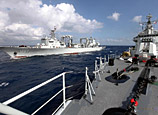
Enthusiasm for boosting the use of the yuan has also spread outside of Asia.
The Bank of England said last month it is prepared in principle to become the first G7 central bank to enter into a foreign exchange swap agreement with China.
Under a swap agreement, central banks agree to exchange each other's currency and can then lend the money out to domestic banks in cases of emergency.
Peng said the move is a major breakthrough as swap agreements were previously confined to developing countries or economies with close bilateral trade connections.
"Now it's extended to a major world financial center of foreign exchange trade, and that means a lot," Peng said.
Britain announced the launch of an offshore yuan currency and bond market in April. The City of London's governing body said it is keen to speed up the city's push to become an offshore center for the yuan.
"(We are) working hard to increase awareness of and confidence in the use of renminbi products and services in London," said Mark Boleat, policy chairman of the City of London Corporation.
"Recent London figures showed particularly strong growth of spot renminbi forex (foreign exchange), which is evidence of the growing liquidity of the offshore yuan market (and) the increasing confidence of investors to trade in it," he said.
In the first half of 2012, the use of the yuan for trade transactions settled in London increased by 390 percent year-on-year to 2.2 billion yuan ($350 million).
By establishing a clearing bank, Singapore and Taiwan are able to independently accommodate yuan flows to and from the Chinese mainland.
This gives investors in Singapore and Taiwan access to many investment opportunities on the mainland unavailable to investors in other places, as the yuan is not freely convertible.
In comparison, offshore yuan accumulated in London can only flow into the Chinese mainland via Hong Kong's clearing bank, the Bank of China's Hong Kong branch.
But Boleat said he does not see an urgent need for London to have a clearing bank as the Hong Kong arrangements serve London's needs.
He added that maintaining a single pool of offshore yuan is important to the development of a liquid, global offshore market. "We hope that developments in other centers will not see segregated pools of renminbi being developed."


















 At 75, he travelled in Europe; at 98, he got a master's degree; at 102, he published an autobiography.
At 75, he travelled in Europe; at 98, he got a master's degree; at 102, he published an autobiography.


![]()
